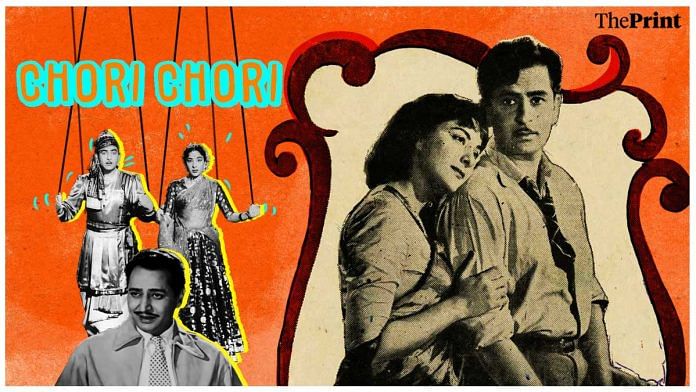When filmmaker Zoya Akhtar announced the making of another road trip film featuring Alia Bhatt, Katrina Kaif and Priyanka Chopra, Gen Z and millennials were on cloud nine. There is something about road trip movies that catch your attention. Whether it is Zindagi Na Milegi Dobara, Jab We Met, or Dil Chahta Hai, Bollywood has utilised this formula smartly, which audiences also enjoy. But the first film to begin this tradition of road trip movies was the Raj Kapoor and Nargis-starrer Chori Chori (1956), also considered one of the first full-fledged romantic comedy films in Indian cinema. It also happened to be the last film in which Raj Kapoor and Nargis were romantically involved on screen.
Chori Chori had everything that a feel-good, entertaining film should have – engaging story, humour, impeccable music, dance sequences and the thrill of a road trip. But what made it monumental was Raj Kapoor and Nargis’ on-screen chemistry, which was a bit different from their earlier films. Both the actors, otherwise known for their moving, heart-wrenching performances, were not giving any social message in this one. They were just roaming about, annoyed with each other at first, but eventually falling in love.
The film is also remembered for its melodious tunes. It is interesting how, even after 65 years, a film song is more popular than the film itself. Shankar Jaikishan made immortal music, and the contribution of the Lata Mangeshkar-Manna Dey duo can not be forgotten either. Their “Yeh Raat Bheegi Bheegi” and “Aaj Sanam Madhur Chandni” are easily the greatest romantic songs ever. Manna Dey’s death anniversary and the search for his iconic songs also led us to this film, which is why ThePrint reviews it this week.
Also read: Shailendra — Everyman’s lyricist who turned into Raj Kapoor’s ‘Pushkin’
A storyline full of drama, comedy and thrill
Kammo (Nargis), affectionately called Baby, is the daughter of a rich businessman. She wants to marry a boy of her choice called Suman (played by Pran), who is only interested in her money, but faces resistance from her father. One day, during a boat ride, she jumps into the sea and decides to swim her way to the shore in order to escape her father’s custody and marry Suman. She makes it to Bangalore to meet him. Meanwhile, Sagar (Raj Kapoor) is an impoverished freelance journalist and writer who is looking for potential stories. He wants to meet his editor in Bangalore to convince him to give some opportunities.
Kammo and Sagar cross paths, and as fate would have it, are bound to travel together. Interesting things happen while they are travelling. Kammo’s father, however, has announced that whoever finds his daughter will be awarded Rs 1.25 lakh. This makes it even more challenging for Sagar and Kammo to travel together, as they move ahead facing new challenges and find themselves falling for each other before a misunderstanding tears them apart.
Also read: Raj Kapoor’s Awara is all the more relevant in the context of India’s migrant crisis
A cultural cocktail that audiences need to appreciate
I wonder, which modern-era film would have a full Bharatnatyam sequence, a kathputli (puppet) dance, a Kathak song, a fishermen’s folk song, all weaved together beautifully. Chori Chori had it all, and it didn’t seem forced. The film reflects how culturally evolved the filmmakers were, and perhaps the audiences too, who made the film a hit.
The beautiful usage Urdu and Hindi words is another thing that catches attention. Especially when a campaign by a clothing brand Fabindia has been under scrutiny for using an Urdu phrase “jashn-e-riwaaz” for its Diwali campaign. Films like Chori Chori remind us how easy it was to show the confluence of various languages without offending people.
In one of the scenes, where self-proclaimed shayar (poet) Johnny Walker is troubling Nargis with his below-average poetry on a bus ride, Raj Kapoor comes to her rescue and says: “Ab ke kaha toh sar par wo misra padega ki qaafiyaa tang ho jaayega (If you say it again, then I will hit you with such a couplet on your head that it will upset your rhythm)”. Here, Misra means a couplet of a ghazal, and “Qaafiyaa” is the rhyming pattern of words. If this was a scolding, then we need such ‘full-of-tehzeeb’ scolding back in our lives.
Also read: An actor, mother, social worker – Nargis Dutt was far more than Mother India
Seeing Nargis and Raj Kapoor in different avatars
One thing that people enjoy about road movies is, besides the fast-changing pace of the story, the way characters evolve. With time, one is deeply invested in Kammo and Sagar’s love story, which evolves from two annoying people travelling together to two people falling for each other, accepting the other with their quirks and imperfections.
The storyline is not perfect, and neither are the characters. There are a couple of offensive instances that would not go well with today’s generation. However, there are other things that make Nargis’s character break the proverbial glass ceiling. “Ishq mein kisi bhi had se guzar jaana (to break one’s boundaries when in love)” – this is what Kammo personifies. Whether it is jumping into the ocean, or questioning her decision of trying to get back to Suman when she finds herself in love with Sagar. She also doesn’t like it when a hotel owner says, “Shareef ghar ki ladkiyan bahar nahin khadi hoti (the women of dignified families do not stand outside like this)”. One can see how she gets frustrated by such comments.
Manna Dey and Lata Mangeshkar’s voices have added depth and character to Kammo and Sagar. Other songs of the film are also quite memorable. “Rasik balma” and “Panchhi banoon udti phiroon” are still considered among Lata Mangeshkar’s bests.
Views are personal.
(Edited by Humra Laeeq)



